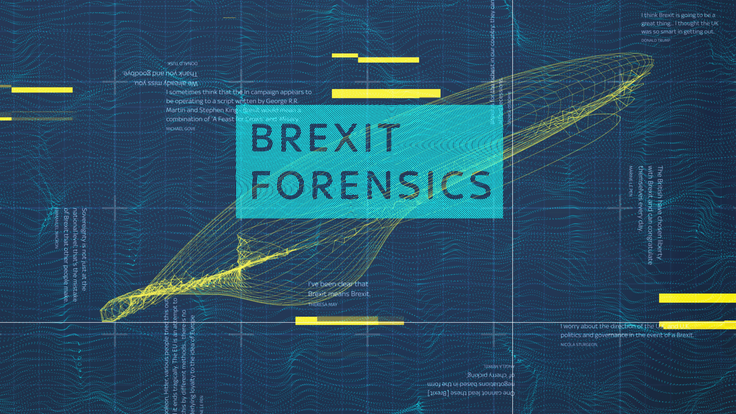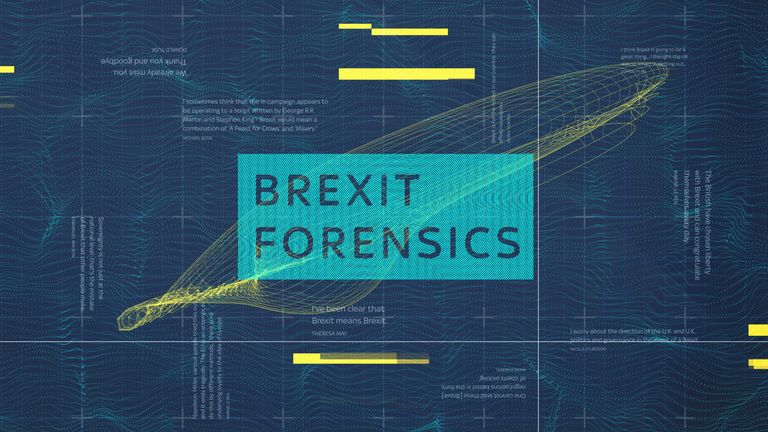Can UK avoid the Brexit fallout from leaving Euratom?

Friday 13 October 2017 21:38, UK
Faisal Islam, Political Editor
"Last June, the British people did not vote to leave Euratom," David Davis was politely told at a Brexit Business Summit at Chevening in July by one of Britain's top nuclear executives, Vincent de Rivaz of EDF Energy.
The Brexit Secretary was invited to consult the lawyers to find a solution.
The honest truth in Government, privately, is that even a year ago ministers were trying to work out if the public really had voted to leave the European Atomic Energy Community.
And in the industry, they are certain that the Government simply did not know that the ECJ sovereignty red line would complicate the nuclear industry.
The blunt assessment of the top strategist of the referendum Leave campaign, Dominic Cummings, was that the Government decision to leave Euratom was made by "morons" who were "near-retarded on every dimension".
But the Government assessment is that it has no legal choice, even though Euratom is legally separate from the European Union, and that Brussels agrees.
The industry and others claim an innovative solution is stymied by the fact Euratom is governed theoretically by the European Court of Justice, and it falls the wrong side of the PM's red line on jurisdiction.
Indeed few can have thought that Theresa May's red line, or indeed the referendum result at all, would flow through the Oxfordshire countryside near Abingdon at the Culham high tech nuclear fusion reactor.
::
The Joint European Torus has been the pinnacle of high tech research in the future of nuclear energy.
The vast majority of its funds have come from the European Union since the decision to build it in the late 1970s.
It was an early fruit of the UK's decision to join the European Economic Community.
In a sign of just how political negotiations are, the final decision to award the UK the facility only came to the UK after the competitor for the facility, the German Government, felt it owed James Callaghan a favour for the SAS operation freeing hostages from a hijacked Lufthansa plane in Mogadishu in 1977.
The result now is a little known global first.
In fact the highest temperatures in the entire solar system, hotter even than the sun, are experienced at the tardis-like centre of the Joint European Torus, when fusion occurs.
The experiments are yet to generate more electricity, however, than it takes to get fusion going, but that is the holy grail for the scientists, the industry and perhaps for the future of the planet.
In the next decade the international effort will shift to the next generation facility ITER being built in France, but the UK's pioneering position should be protected.
However, Brexit, and in particular the withdrawal from Euratom, has thrown things into doubt.
The chief executive of the UK Atomic Energy Authority, Professor Ian Chapman, told Sky News: "Leaving Euratom is absolutely an existential threat for us as an organisation, about two thirds of my turnover comes from the European commission.
"So we have to find a resolution so we can continue to do the world class cutting edge science that we do here."
Its contract expires next year, and decisions need to be made in the coming months over the wider negotiations.
Research is just one aspect of the unexpected fallout from Brexit on the nuclear industry.
It is proving extremely important, however, in the political battle.
Sky News has learnt that a cross-party amendment will be published on Monday to the EU Withdrawal Bill.
It will be tabled under the name of the local MP, the former Conservative minister Ed Vaizey and Rachel Reeves, the Labour MP, and chair of the Business Select Committee.
It will prevent the Government from leaving Euratom unless it publishes a strategy for how trading, research and safeguarding will be maintained, and that the strategy is voted for in both Houses of Parliament.
The pair of MPs wrote a newspaper article in July backed by 7 other Conservative MPs to "save" the Euratom Treaty.
Additionally, Ken Clarke voted to stay in Euratom during a debate on the Article 50 Bill.
The amendment accords with sentiment in the industry which praises the attempts at reassurance from officials in the Business Department but now fears that the clock has run down on realistically replacing the global nuclear arrangements currently enjoyed by the UK through Euratom, by the time of legal Brexit.
It is a strategy and a plan of action that most of the industry now eagerly awaits, with time now running out ahead of Brexit Day.
It is an understandably secretive industry, a mixture of scientific genius, state backing, and very high security.
Its supply chain of crude uranium, enriched at factories across Europe, and then processed, reprocessed and dealt with in high tech reactors with specialist parts and know how, and then expensively decommissioned is all subject to stringent controls and safeguards on use and trade.
In evidence to the House of Lords Select Committee, Angela Hepworth, a director at the UK's biggest generator of nuclear power EDF energy said: "Having Nuclear Co-operation Agreements in place with third countries is absolutely critical on day one.
"For example, for the US, if there is not a Nuclear Co-operation Agreement in place between the US and another country, it is illegal for somebody in the US to export nuclear material or even share nuclear information with that country."
If this did not happen, she warned of long term outages at nuclear power stations.
"We would not be able to share nuclear components or nuclear information with those countries.
"As a practical example, if we had a component fail in one of our power stations and we needed to import a part from one of those countries, if we could not do it, it might be the case that we would end up with extended outages at our nuclear facilities or plants out of operation."
The issue is that these third party deals need to be legally ratified in the US, and for example Japan, Australia and Canada.
For the US that will mean a negotiation, a vote in Congress, and the signature of President Trump.
That process cannot begin until the UK has an accredited domestic safeguarding system, which requires negotiations with the International Atomic Energy Agency in Vienna.
That process has barely started, though the Nuclear Safeguards Bill has just been introduced in the House of Commons.
On top of that, a new arrangement with Euratom is required of the like that has never before existed.
The Government has introduced the Nuclear Safeguards Bill into the Commons - it has its Second Reading on Monday.
::
This is the minimum step required to establish a domestic safeguarding regime to replace the European one.
This should be possible in time.
That has not greatly encouraged the industry, merely parked the possibility of inadvertently becoming a nuclear pariah state outside the IAEA.
But the rest of the story has left key industry officials with "no degree of confidence that alternative arrangements are in hand ... as there is no detailed plan to execute," said one.
Indeed the top Brexit official at the very organisation that will be charged with replacing European checks - the Office for Nuclear Regulation - told the House of Lords that a March 2019 timetable will be "highly challenging".
Everything is possible on a longer timescale, but no one in the industry would tell Sky News that the necessary treaty changes could be reached by March 2019.
Opening up treaties also creates negotiation vulnerabilities, as Liam Fox is now discovering in relation to tariff quotas and the US, Australia and New Zealand at the World Trade Organisation.
They see a genuine risk of nuclear materials and components ceasing to move in an orderly fashion.
Some businesses have activated their business continuity plans to be able to cope with disruption by having the controlled materials in the right place, before any legal back hole.
Five to ten years would be a reasonable timeframe for making the changes required after four decades of operating through Euratom.
The industry awaits the penny dropping in Government by the "middle of next year".
But at least there will be new freedoms for the industry to enjoy, less European red tape to hold it back?
No, says the industry bluntly.
"No upsides, only downsides that we can try to manage," said one top executive.
Is there another way out?
Associate membership is a possibility, but does not exist for the most crucial role of the current system - safeguarding the use of fissile material for civilian rather than military use.
There is not yet a solution to the fusion research issue - which in theory should be straightforward - it is about funding.
And all of this requires cast iron legal certainty rather than winging it with an untested legal innovation.
There is a very specific deal that David Cameron struck with President Obama essentially to swap 700kg of nuclear waste from Dounreay in Scotland with US waste that will be converted into medical isotopes in France by Euratom.
Little is certain about anything.
Nuclear power and research needs certainty and stability like no other industry, and has been built on a European basis even more than the car industry.
And can there be an industry for which the public also desires stability more than this?
It could yet become quite the unexpected Brexit battleground on Parliament.
:: Beneath the sound and the fury of the Brexit negotiations, what's actually going on ? "Brexit Forensics" is a regular series of stories from our top specialist correspondents, revealing the issues and the themes behind the headlines that will really determine the course of the Brexit revolution.





